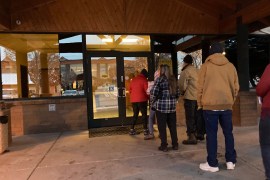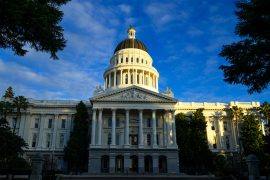In the arguments before the Supreme Court Tuesday on the insurance mandate – sometimes referred to as the minimum coverage provision – conservative justices aggressively challenged the government’s position. U.S. Solicitor General Donald B. Verrilli Jr. represented the government. Paul D. Clement and Michael A. Carvin represented those contesting the law.
Here are excerpts:
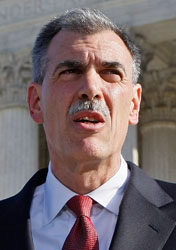
Verrilli
?VERRILLI (opening arguments): Mr. Chief Justice, and may it please the Court:
The Affordable Care Act addresses a fundamental and enduring problem in our health care system and our economy. Insurance has become the predominant means of paying for health care in this country. For most Americans, for more than 80 percent of Americans, the insurance system does provide effective access. But for more than 40 million Americans who do not have access to health insurance either through their employer or through government programs such as Medicare or Medicaid, the system does not work. Those individuals must resort to the individual market, and that market does not provide affordable health insurance.
It does not do so because, because the multibillion dollar subsidies that are available for the, the employer market are not available in the individual market. It does not do so because ERISA and HIPAA regulations that preclude, that preclude discrimination against people based on their medical history do not apply in the individual market. That is an economic problem. And it begets another economic problem.
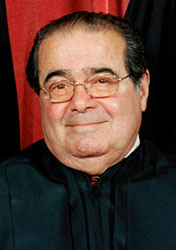
Scalia
JUSTICE SCALIA: Why aren’t those problems that the Federal Government can address directly?
VERRILLI: They can address it directly, Justice Scalia, and they are addressing it directly through this, through this Act by regulating the means by which health care, by which health care is purchased. That is the way this Act works.
Under the Commerce Clause, what, what Congress has done is to enact reforms of the insurance market, directed at the individual insurance market, that preclude, that preclude discrimination based on pre-existing conditions, that require guaranteed issue and community rating, and it uses — and the minimum coverage provision is necessary to carry into execution those insurance reforms.
JUSTICE KENNEDY: Can you create commerce in order to regulate it?
VERRILLI: That’s not what’s going on here, Justice Kennedy, and we are not seeking to defend the law on that basis.
In this case, the — what is being regulated is the method of financing health, the purchase of health care. That itself is economic activity with substantial effects on interstate commerce….
——————————
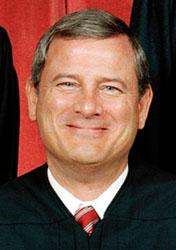
Roberts
CHIEF JUSTICE ROBERTS: So can the government require you to buy a cell phone because that would facilitate responding when you need emergency services? You can just dial 911 no matter where you are?
VERRILLI: … I don’t think we think of that as a market. This is a market. This is market regulation….
——————————
JUSTICE ALITO: Do you think there is a, a market for burial services?
VERRILLI: For burial services?
JUSTICE ALITO: Yes.
VERRILLI: Yes, Justice Alito, I think there is.
JUSTICE ALITO: All right, suppose that you and I walked around downtown Washington at lunch hour and we found a couple of healthy young people and we stopped them and we said, “You know what you’re doing? You are financing your burial services right now because eventually you’re going to die, and somebody is going to have to pay for it, and if you don’t have burial insurance and you haven’t saved money for it, you’re going to shift the cost to somebody else.”
Isn’t that a very artificial way of talking about what somebody is doing?
VERRILLI: No, that –
JUSTICE ALITO: And if that’s true, why isn’t it equally artificial to say that somebody who is doing absolutely nothing about health care is financing health care services?
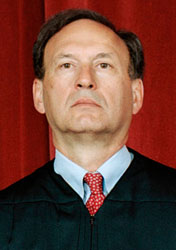
Alito
VERRILLI: It’s, I think it’s completely different. The — and the reason is that the, the burial example is not — the difference is here we are regulating the method by which you are paying for something else — health care — and the insurance requirement — I think the key thing here is my friends on the other side acknowledge that it is within the authority of Congress under Article I under the commerce power to impose guaranteed-issue and community rating forms, to end — to impose a minimum coverage provision. Their argument is just that it has to occur at the point of sale, and –
JUSTICE ALITO: I don’t see the difference. You can get burial insurance. You can get health insurance. Most people are going to need health care. Almost everybody. Everybody is going to be buried or cremated at some point. What’s the difference?
VERRILLI: Well, one big difference, one big difference, Justice Alito, is the — you don’t have the cost shifting to other market participants. Here –
JUSTICE ALITO: Sure you do, because if you don’t have money then the State is going to pay for it….
VERRILLI: That’s a difference and it’s a significant difference. In this situation one of the economic effects Congress is addressing is that the — there — the many billions of dollars of uncompensated costs are transferred directly to other market participants. It’s transferred directly to other market participants because health care providers charge higher rates in order to cover the cost of uncompensated care, and insurance companies reflect those higher rates in higher premiums, which Congress found translates to a thousand dollars per family in additional health insurance costs….
——————————
JUSTICE SCALIA: Could you define the market — everybody has to buy food sooner or later, so you define the market as food, therefore, everybody is in the market; therefore, you can make people buy broccoli.
VERRILLI: No, that’s quite different. That’s quite different. The food market, while it shares that trait that everybody’s in it, it is not a market in which your participation is often unpredictable and often involuntary. It is not a market in which you often don’t know before you go in what you need, and it is not a market in which, if you go in and — and seek to obtain a product or service, you will get it even if you can’t pay for it….
——————————
JUSTICE SCALIA: …. I don’t agree with you that the relevant market here is health care. You’re not regulating health care. You’re regulating insurance. It’s the insurance market that you’re addressing ….
VERRILLI: Well, to the extent that we are looking at the comprehensive scheme, Justice Scalia, it is regulating commerce that already exists out there. And the means in which that regulation is made effective here, the minimum coverage provision, is a regulation of the way in which people participate, the method of their payment in the health care market. That is what it is. …
——————————
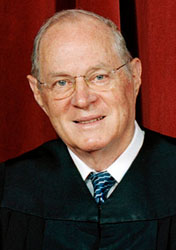
Kennedy
JUSTICE KENNEDY: … The reason this is concerning is because it requires the individual to do an affirmative act. In the law of torts our tradition, our law, has been that you don’t have the duty to rescue someone if that person is in danger. The blind man is walking in front of a car and you do not have a duty to stop him absent some relation between you. And there is some severe moral criticisms of that rule, but that’s generally the rule.
And here the government is saying that the Federal Government has a duty to tell the individual citizen that it must act, and that is different from what we have in previous cases and that changes the relationship of the Federal Government to the individual in the very fundamental way.
VERRILLI: I don’t think so, Justice Kennedy, because it is predicated on the participation of these individuals in the market for health care services. Now, it happens to be that this is a market in which, aside from the groups that the statute excludes, virtually everybody participates. But it is a regulation of their participation in that market.
CHIEF JUSTICE ROBERTS: But your theory is that there is a market in which everyone participates because everybody might need a certain range of health care services, and yet you’re requiring people who are not — never going to need pediatric or maternity services to participate in that market….
——————————
JUSTICE ALITO: Are you denying this? If you took the group of people who are subject to the mandate and you calculated the amount of health care services this whole group would consume and figured out the cost of an insurance policy to cover the services that group would consume, the cost of that policy would be much, much less than the kind of policy that these people are now going to be required to purchase under the Affordable Care Act?
VERRILLI: Well, while they are young and healthy that would be true. But they are not going to be young and healthy forever. They are going to be on the other side of that actuarial equation at some point. And of course you don’t know which among that group is the person who’s going to be hit by the bus or get the definitive diagnosis. And that –
JUSTICE ALITO: The point is — no, you take into account that some people in that group are going to be hit by a bus, some people in that group are going to unexpectedly contract or be diagnosed with a disease that — that is very expensive to treat. But if you take their costs and you calculate that, that’s a lot less than the amount that they are going to be required 33 to pay.
So that you can’t just justify this on the basis of their trying to shift their costs off to other people, can you?
VERRILLI: Well, the — the people in that class get benefits, too, Justice Alito. They get the guaranteed-issue benefit that they would not otherwise have, which is an enormously valuable benefit.
And in terms of the — the subsidy rationale, I — I don’t think — I think it’s — it would be unusual to say that it’s an illegitimate exercise of the commerce power for some people to subsidize others. Telephone rates in this country for a century were set via the exercise of the commerce power in a way in which some people paid rates that were much higher than their costs in order to subsidize –
JUSTICE SCALIA: Only if you make phone calls….
——————————
CHIEF JUSTICE ROBERTS: …But once we say that there is a market and Congress can require people to participate in it, as some would say — or as you would say, that people are already participating in it — it seems to me that we can’t say there are limitations on what Congress can do under its commerce power, just like in any other area, all — given significant deference that we accord to Congress in this area, all bets are off, and you could regulate that market in any rational way….
——————————
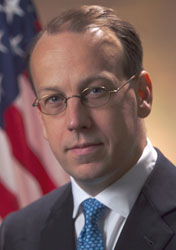
Clement
PAUL CLEMENT (opening arguments): Mr. Chief Justice and may it please the Court. The mandate represents an unprecedented effort by Congress to compel individuals to enter commerce in order to better regulate commerce.
The Commerce Clause gives Congress the power to regulate existing commerce. It does not give Congress the far greater power to compel people to enter commerce to create commerce essentially in the first place.
Now, Congress when it passed the statute did make findings about why it thought it could regulate the commerce here, and it justified the mandate as a regulation of the economic decision to forego the purchase of health insurance. That is a theory without any limiting principle….
——————————
JUSTICE GINSBURG: Mr. Clement, doesn’t that work — that work the way Social Security does?
Let me put it this way. Congress, in the ’30s, saw a real problem of people needing to have old age and survivor’s insurance. And yes, they did it through a tax, but they said everybody has got to be in it because if we don’t have the healthy in it, there’s not going to be the money to pay for the ones who become old or disabled or widowed. So they required everyone to contribute.
It was a big fuss about that in the beginning because a lot of people said — maybe some people still do today — I could do much better if the government left me alone. I’d go into the private market, I’d buy an annuity, I’d make a great investment, and they’re forcing me to paying for this Social Security that I don’t want; but, that’s constitutional.
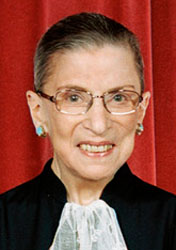
Ginsburg
So if Congress could see this as a problem when we need to have a group that will subsidize the ones who are going to get the benefits, it seems to me you are saying the only way that could be done is if the government does it itself; it can’t involve the private market, it can’t involve the private insurers. If it wants to do this, Social Security is its model. The government has to do — has to be government takeover. We can’t have the insurance industry in it. Is that your position?
CLEMENT: No. I don’t think it is, Justice Ginsburg. I think there are other options that are available.
The most straightforward one would be to figure out what amount of subsidy to the insurance industry is necessary to pay for guaranteed issue and community rating. And once we calculate the amount of that subsidy, we could have a tax that’s spread generally through everybody to raise the revenue to pay for that subsidy. That’s the way we pay for most subsidies….
——————————
MICHAEL CARVIN: It is clear that the failure to buy health insurance doesn’t affect anyone. Defaulting on your payments to your health care provider does. Congress chose for whatever reason not to regulate the harmful activity of defaulting on your health care provider. They used the 20 percent or whoever among the 102 uninsured as a leverage to regulate the 100 percent of the uninsured.
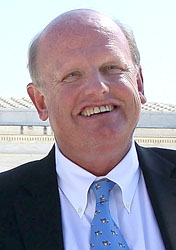
Carvin
JUSTICE KENNEDY: I agree — I agree that that’s what’s happening here.
CARVIN: Okay.
JUSTICE KENNEDY: And the government tells us that’s because the insurance market is unique. And in the next case, it’ll say the next market is unique. But I think it is true that if most questions in life are matters of degree, in the insurance and health care world, both markets — stipulate two markets — the young person who is uninsured is uniquely proximately very close to affecting the rates of insurance and the costs of providing medical care in a way that is not true in other industries. That’s my concern in the case.





